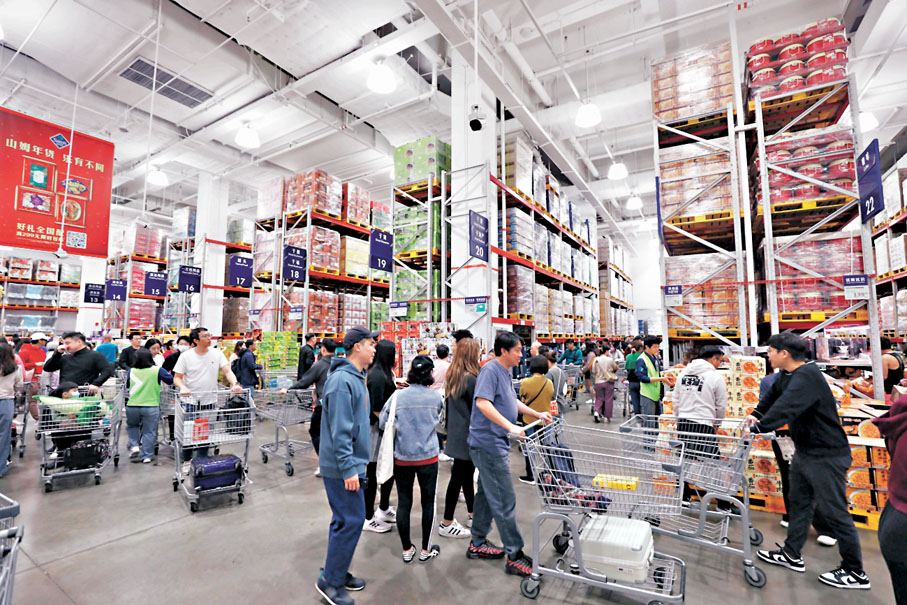【社評雙語道】同城化提生活品質 良性競爭利市場優化

【原文】摘錄自2024年1月4日香港《文匯報》近來港人北上消費蔚為風潮,本港有旅行社推出「山姆超市掃貨團」,吸引逾3,000人報名,本月50團近乎全額爆滿。隨着大灣區一日生活圈日益成形,港深同城化的趨勢給予了港人更多的消費選擇,提升了港人的生活品質,同時可以刺激本地商家積極調整經營模式,推動差異化發展。長遠而言,良性競爭的市場環境一定會帶來進步,有利市場優化發展,並最終令消費者得益,對港深兩地市民而言都是好事。
自兩地復常通關以來,港人北上食住玩的趨勢日益明顯,一方面是疫情三年後的報復性消費,另一方面是內地較為創新的產品和消費模式,能夠滿足港人的嘗鮮心態。從市場生態的變化而言,港深兩地兩個市場正逐漸滲透融合,消費者無論北上還是南下都非常方便,這無形中擴大了本港消費者的選擇權,提升了港人的生活質素,對香港營商環境的進步亦有着深刻的影響。
首先,北上超市掃貨團的背後,反映的是港深兩地的差異化發展。本港生活零售市場被兩大超市集團壟斷,購物環境雷同,貨品選擇相似,是比較典型的寡頭壟斷市場。早年曾有外國大型超市集團落戶本港,亦在短短幾年後鎩羽而歸,可見本地市場壟斷程度之高。
相對而言,內地市場廣闊,超市面積更大、貨品選擇更多。除了熱衷去本港沒有的山姆超市掃貨,即將落戶深圳的華南地區首家Costco(開市客),尚未開業就被眾多港人鎖定,可見一河之隔的深圳市場已經為本地市場帶來有效的競爭。
其次,北上掃貨潮能刺激跨境消費模式的日趨完善,有利於兩地市場的進一步整合。所謂有需求就會有商機,以超市掃貨團為例,除了超市增加了一批港客之外,亦衍生不少周邊服務需求。
例如直通巴公司不斷增加本港到內地大型超市的直通巴;快遞公司推出「半日達」快遞服務,為港人送貨上門;甚至有旅行社推出掃貨旅行團。港人只要頭腦靈活,同樣可以把握到這股跨境購物潮帶來的商機。同樣地,本地大型購物點亦可以借鑒內地的做法,完善內地消費者南下購物的配套服務,實現雙向良性競爭。
再次,跨境消費熱潮能刺激本地營商環境的變革,長遠而言對提升本港市場競爭力是一件好事。本港是自由港,貨物進出口十分方便,過往正是憑藉這種優勢獲得內地消費者的青睞。現在仍有不少內地旅客喜歡來港購物,只是相對而言,內地市場的物美價廉日益受到本港市民的重視。這種兩地市場雙向的流動互動,是市場一體化的表現。本港商家應該正面看待這種良性競爭,積極提升產品和服務的競爭力,不能再視本港為一個細小的封閉市場而墨守成規。
A metropolis of two cities: enhancing life quality and optimising the market
【譯文】Recently, it has become a growing trend for Hong Kong residents to “trip north” to Shenzhen for consumption and a local travel agency has launched the “Sam's Club Shopping Tour”, which has attracted more than 3,000 bookings, and 50 tours in this month are almost fully booked. As the one-day living sphere of the Greater Bay Area takes shape, the trend of Hong Kong-Shenzhen metropolis gives Hong Kong residents more choices for consumption and improves their quality of life, while at the same time stimulating local merchants to actively adjust their business models and promote differentiated development. In the long run, a market environment with healthy competition will definitely bring progress and facilitate market optimisation and development, and ultimately benefit consumers, which is good for the residents of Hong Kong and Shenzhen.
Since the full resumption of normal travel between Hong Kong and the Mainland, there has been a growing trend of Hong Kong residents going north for dining, accommodation and entertainment. On the one hand, this is due to the revenge spending after three years of the Pandemic; on the other hand, the mainland's more innovative products and consumption models can satisfy Hong Kong people's curiosity about new products. In terms of changes in market ecology, the two markets in Hong Kong and Shenzhen are gradually penetrating and integrating, and it is very convenient for consumers to go north or south, which has virtually expanded the choices of Hong Kong consumers, upgraded the life quality of Hong Kong residents, and has a profound impact on the progress of the business environment in Hong Kong.
First of all, the northbound supermarket shopping tours are a reflection of the differentiated development between Hong Kong and Shenzhen. The local food and grocery retail market was monopolised by the two major supermarket groups, with similar shopping environments and similar product choices, making it a relatively typical oligopolistic market. In the early years, a large foreign supermarket group was set up in Hong Kong, but returned after a few years, showing a high degree of market monopoly in the local market. In contrast, the Mainland market is vast, with larger supermarkets and more choices of products. Apart from Sam's supermarkets which are not available in Hong Kong, the first Costco in South China which will soon settle in Shenzhen has been targeted by many Hong Kong residents even before it opens, showing that the Shenzhen market across the river, has already brought effective competition to the local market.
Secondly, the northbound shopping wave can stimulate the improvement of cross-border consumption patterns, which is conducive to the further integration of the two markets. As the saying goes, where there is demand, there will be business opportunities. Take supermarket shopping tours as an example, apart from the increase in the number of Hong Kong customers in supermarkets, it has also given rise to a lot of demand for peripheral services.
For example, bus companies have been increasing the number of cross-border buses from Hong Kong to major supermarkets in the Mainland, express delivery companies have introduced a "half-day delivery" service to deliver goods to the doorsteps of Hong Kong residents, and even travel agencies have launched shopping tours. Hong Kong people can also capitalise on the business opportunities brought by this wave of cross-border shopping if they are smart enough. Similarly, local large-scale shopping malls can also learn from the practice of the Mainland and improve the ancillary services for mainland consumers who go south for shopping, so as to achieve two-way healthy competition.
Moreover, the boom in cross-boundary consumption can stimulate the transformation of the local business environment, which is good for enhancing Hong Kong's market competitiveness in the long run. Hong Kong is a free port and it is very convenient for goods to be imported and exported. In the past, it was precisely by virtue of this advantage that mainland consumers favoured Hong Kong. Nowadays, many mainland tourists still like to shop in Hong Kong, but comparatively speaking, the quality and low price of goods in the mainland market are increasingly valued by Hong Kong residents. This two-way flow and interaction between the two markets is a manifestation of market integration. Local businesses should take a positive view of this kind of healthy competition and actively enhance the competitiveness of their products and services, instead of regarding Hong Kong as a small and closed market and keeping stuck in a rut.
◆ 琬琰
